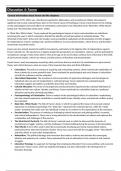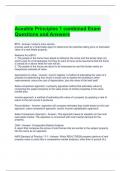Discussion 4: Fanon
General information about Fanon and the chapters:
Frantz Fanon (1925–1961) was a Martinican psychiatrist, philosopher, and revolutionary thinker who played a
significant role in post-colonial theory. Born in the French colony of Martinique, Fanon is best known for his writings
on the psychological and social effects of colonization, particularly in his influential works "Black Skin, White Masks"
(1952) and "The Wretched of the Earth" (1961).
In "Black Skin, White Masks," Fanon explored the psychological impact of racism and colonialism on individuals,
examining the ways in which colonialism affected the identity and self-perception of colonized people. "The
Wretched of the Earth" delves into the broader social and political implications of decolonization and the struggles
for independence. Fanon's writings had a profound influence on post-colonial studies, critical theory, and liberation
movements around the world.
Fanon was also actively involved in political movements, particularly in the Algerian War of Independence against
French colonial rule. His experiences in Algeria shaped his perspectives on colonialism, violence, and the potential for
revolutionary change. Frantz Fanon died in 1961 at the age of 36, but his ideas continue to be influential in the fields
of post-colonial studies, critical race theory, and discussions on liberation and decolonization.
Frantz Fanon's work encompasses several key ideas and terms that are central to his contributions to post-colonial
theory and critical discourse. Here are some of the important key ideas and their definitions:
Colonialism: The policy or practice of acquiring and maintaining colonies, often involving the exploitation of
these colonies by a more powerful state. Fanon analyzed the psychological and social impact of colonialism
on both the colonizers and the colonized.
Internalized Oppression: The acceptance and incorporation of oppressive ideologies and stereotypes by
individuals who are part of marginalized or colonized groups. Fanon explored how colonized people
internalize negative perceptions and beliefs about their own identity.
Colonial Alienation: The sense of estrangement and disconnection experienced by colonized individuals in
relation to their own culture, identity, and history. Fanon examined how colonialism leads to a profound
alienation among the colonized population.
Psychopathology of Colonization: Fanon's analysis of the psychological effects of colonialism, emphasizing
how the colonial experience contributes to mental health issues, identity crises, and internal conflicts among
the colonized.
Black Skin, White Masks: The title of Fanon's book, in which he explored the impact of racial and colonial
oppression on individual psychology. The "black skin" represents the colonized person, while the "white
masks" symbolize the masks worn by individuals as they try to conform to the expectations of the colonizers.
Decolonization: The process of undoing or challenging colonial structures and gaining political, economic,
and cultural independence. Fanon was a strong advocate for the decolonization of nations and explored the
complexities and challenges of this process.
The Wretched of the Earth: The title of Fanon's seminal work, in which he discussed the dynamics of
revolutionary struggle, violence, and the challenges of nation-building during the process of decolonization.
Third World: A term often used to describe economically developing and newly industrialized nations,
particularly those that were formerly colonies. Fanon was concerned with the struggles of the "Third World"
and their efforts to assert their independence.
Nationalism: The political ideology and movement that seeks to achieve and maintain the sovereignty,
identity, and autonomy of a nation. Fanon examined the role of nationalism in the context of anti-colonial
struggles.
Liberation Theology: An approach to theology that emphasizes liberation from social, political, and economic
oppression. Fanon's work, while not explicitly theological, has been influential in the development of
liberation theology.
, The text: Frantz Fanon – Concerning violence
Summary of the chapters
The provided text is an excerpt from the chapter titled "CONCERNING VIOLENCE" in Frantz Fanon's influential work,
"The Wretched of the Earth." Below is a summary of the key points discussed in this chapter:
1. Decolonization as a Violent Phenomenon:
Decolonization, according to Fanon, is always a violent process. It involves the replacement of one "species" of
people with another, without a transition phase. The transformation is both social and psychological.
2. Two Opposing Forces:
Decolonization is a historical process resulting from the meeting of two opposing forces—the colonized and the
colonizer. The initial encounter was marked by violence, and their coexistence was sustained through oppression.
3. Creation of New Men:
Decolonization brings about a fundamental change in individuals, transforming them from passive spectators to
active participants in history. It creates new rhythms, languages, and a new humanity.
4. Challenge to Colonial Structure:
Decolonization necessitates a complete reevaluation of the colonial situation. The process challenges the existing
social structure and demands a reconsideration of the status quo.
5. Divided Colonial World:
The colonial world is divided into distinct compartments, separating the settlers from the natives. The colonial
context is marked by racial and spatial segregation, with the settlers enjoying a privileged, well-fed, and well-lit
lifestyle.
6. Dehumanization of the Native:
The colonizer uses dehumanizing language, equating the native with evil and often resorting to zoological terms. This
Manichean worldview reinforces the settler's superiority and justifies colonial violence.
7. Resistance and Mockery:
The native's resistance to colonization involves challenging Western values. Mockery and rejection of these values
become acts of defiance. The more the colonizer asserts the supremacy of Western culture, the more the native
resists.
8. Violence as a Tool for Liberation:
Fanon argues that violence becomes a necessary tool for decolonization. The native, ready for violence from birth,
sees it as the only means to question and overturn the oppressive colonial system.
In essence, Fanon explores the complexities and contradictions inherent in the process of decolonization,
emphasizing the role of violence as a means to achieve liberation and the creation of a new, self-determined society.
9. Rest of the text:
In this passage, Frantz Fanon discusses the dynamics of violence in the context of decolonization. He highlights the
hidden tensions and power struggles within colonized societies, especially in the relationship between the colonized
intellectuals and the colonialist bourgeoisie. During decolonization, the colonialist bourgeoisie, realizing the
impossibility of maintaining dominance, attempts to engage in a rearguard action by focusing on culture, values, and
other aspects.
Fanon emphasizes the disconnect between the colonized population, whose primary concern is the land and dignity,
and the intellectual elite engaging in abstract dialogues with the colonialists. The colonized people's morality is
concrete and aims to silence the oppressor. The intellectual, often influenced by colonial thinking, fails to see the
settler's disinterest in coexisting once the colonial context disappears.
As decolonization progresses, the colonized people seek to unify themselves, often on national or racial grounds.
However, the process is complicated by the actions of the colonized intellectuals, who, influenced by the colonialist
bourgeoisie, may pursue unfair promotions and contribute to internal conflicts. Fanon discusses the eradication of





